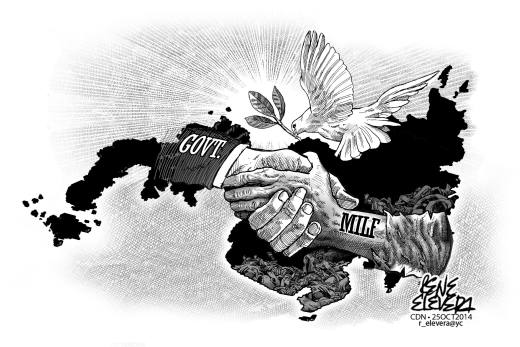The giant strides in the peace process between the government and the Moro Islamic Liberation Front should be a nationwide concern.
Discussion of issues on the proposed Bangsamoro Basic Law (BBL) – now on deliberation by both houses of Congress – should transcend even the highest parochial walls.
Talking before the Media and Peace Program Roundtable in Manila last Wednesday, Thomas Phipps, second secretary for political and security of the British Embassy, said it is important to frame the
Mindanao conflict as a national issue that should concern every Filipino wherever he is.
For example, he said, British companies do not specify where the conflict in the country is, but will generally consider the conflict in Mindanao as a conflict in the Philippines. And generally, investors back off from conflict areas.
Communicating the overarching implications of conflict and peace initiatives is a major role of the media.
Dr. Kimmo Roobert Kiljunen of the Foreign Ministry of Finland said that in representative democracies, the media plays a vital role in creating an image of reality. The accuracy of this image has an impact on the result of peace initiatives and policy as well as public response.
Dean Luis Teodoro of the Center for Media Freedom and Responsibility (CMFR) which has been monitoring Philippine media coverage on peace and conflict issues noted that based on their January to June 2014 monitoring, “hopes for peace dominated the framing of reports on Bangsamoro developments.”
The Comprehensive Agreement on the Bangsamoro signed in January this year, which will end the armed conflict between the government and the MILF, is anchored on the constitutional principles of devolution and autonomy.
Rep. Rufus Rodriguez of Cagayan de Oro who is leading the congressional review of the proposed BBL agreed with Phipps’ point on the nationwide implications of peace or conflict.
Conflict and attending to the victims of conflict will strain national resources better spent on social services, public infrastructure – development in general, said Rodriguez. So a lasting peace with the MILF will benefit every Filipino, whether one is in Batanes, Jolo or Cebu.
Peace Secretary Ging Deles is hopeful that even those who oppose the BBL and the establishment of the Bangsamoro authority will be overjoyed with the outcome of the peace process.
The Aquino government, she said, is committed to reward with development those who support genuine autonomy and devolution to the Bangsamoro.
In the proposed BBL, local government units in the Bangsamoro will get 75 percent share of the national taxes collected in their areas, five percent more than the 70 percent the Autonomous Region in Muslim Mindanao (ARMM) currently gets.
This is something other local government units (LGUs) in the country can only envy because they only get 40 percent.
But instead of being envious, this is something all LGUs should look forward to as a guide to get a better share of the pie appropriated by the national government.
